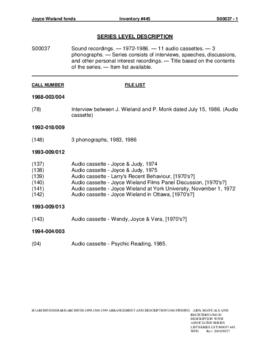Series consists of three sub-divisions: Scores for films; Scores for radio and television; Scores for theatre. Some of the scores include sketches, shooting scripts, parts, music cues, correspondence with directors and producers. The scores for films contains scores for National Film Board productions, including 'Alexis Tremblay, habitant' (1942) 'Arctic saga,' (1952), 'Athabasca,' (1967), 'Canadian profile,' (1956), 'The forest,' (1965), 'Krieghoff,' (1955), 'Paddle to the sea,' (1966), 'Royal journey,' (1951 Royal Tour), and 'Varley,' (1952). In addition, there is a good deal of NFB stock music composed by Applebaum. There are also scores for American government agencies (United States Army Reorientation Branch, United States Navy, Georgia Department of Health, Mississippi Department of Public Health). As well, there are Hollywood scores for 'Lost boundaries, '(1949), 'Story of G.I. Joe.' (1945), 'Tomorrow the world,' (1944), and scores for American productions including the Hans Richter film 'Dreams that money can buy,' (1952) with music by John Cage, Paul Bowles, and Applebaum. For radio and television there are scores for 'And then we wrote,' (1967), the CBC National News theme (1966-1967), scores for the CBC Television programmes "Camera Canada," ('Campus in the clouds,' 'Hockey,' etc), 'The discoverers,' (1972) "First performance" ('Black of the moon,' 'O'Brien,' 'Time lock,'), 'Images of Canada,' (1972), 'The journal of Susanna Moodie,' (1971), 'Mr. Piper,'[children's programme] (1961-1963), 'Peer Gynt,' (1957), "CBC playhouse," ('The ghost in the corpse,' 'The girl queen at the world's end,' 'How the Tongans came to Fiji,' 'The McAndrew family,' 'The viking and the vixen,')(1952), "Purple playhouse" ('The bells,' 'Corsican brothers,' 'Dracula,' 'Sweeney Todd,' 'Used up,') (1973), 'Scope' (1955), 'Seven days of victory' (1955), and several more. There are also scores for the Columbia Broadcasting System programme "Twentieth Century," and scores for the United Nations radio service. For CBC - Radio there are scores for "Summer stage" ('Always a librarian--never a bride,' 'Burlap bags,' 'For whom the horses run,' 'Prophecy at dawn,' 'Tidewater morning,'), "Wednesday night" ('Antigone,' 'Hamlet,' 'Juno and the paycock,' 'The playboy of the western world,' 'The shaking tent,' 'Words & music,'), and others. For theatre there are scores for Stratford productions including 'Anthony and Cleopatra' (1967, 1976), 'Coriolanus,' (1961), 'Cyrano,' (1963), 'Hamlet,' (1957, 1969) 'King Lear,' (1964) 'Much ado about nothing,' (1958, 1980, 1987) 'Twelfth night,' (1966, 1985), 'Macbeth,' (1978), 'Cymberline,' (1986), 'Mystery of Henry Moore,' (1984), 'The man who hid Anne Frank,' (1980), as well as other theatre productions in Toronto and New York.

